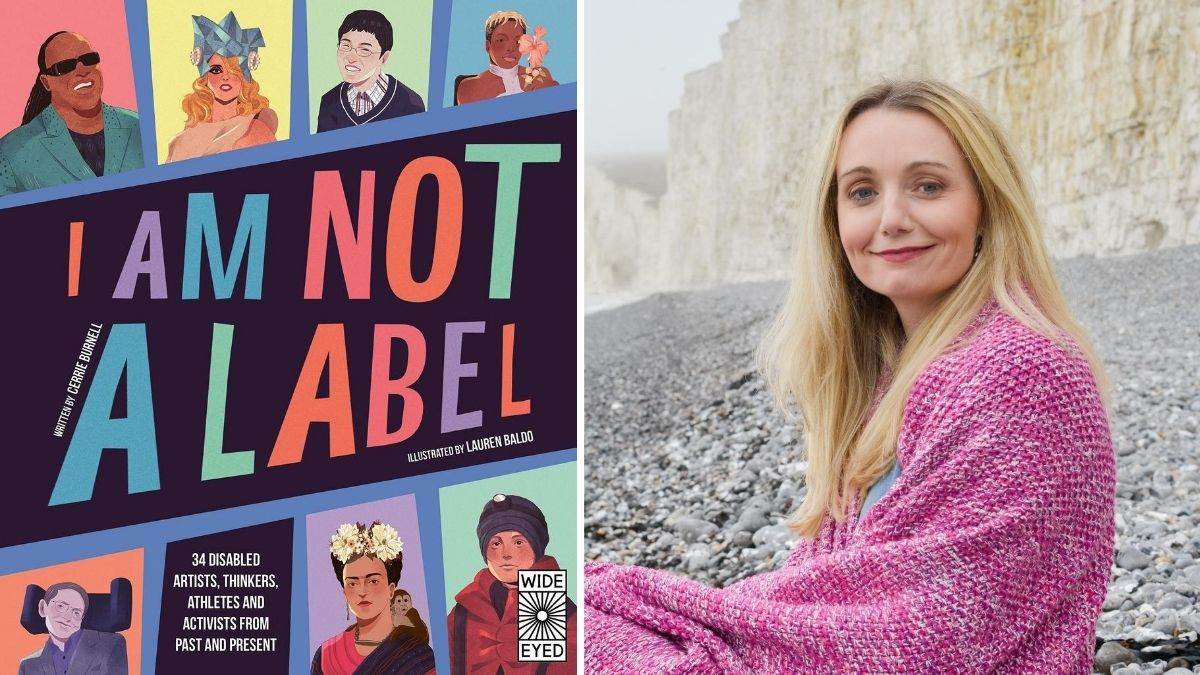"Every child deserves to have their life represented" - Cerrie Burnell on I Am Not A Label
Published on: 27 July 2020
Cerrie Burnell's new book, I Am Not A Label, celebrates the different ways that people experience disability. Cerrie answered some of our questions about the book, growing up with a disability, and the importance of representation.
 Cerrie Burnell and the cover of her new book, I Am Not A Label
Cerrie Burnell and the cover of her new book, I Am Not A Label
Thanks so much for talking to us about your fantastic new nonfiction book, I Am Not A Label. First, what inspired you to want to put this book together?
Growing up with a disability is a wonderfully unique experience, sometimes challenging, often enlightening, always human. I wanted to create a book that documented this honestly and celebrated the different ways in which people experience disability. There is an assumption that having an impairment is a something negative, or that you have to be extremely brave and heroic to live a happy life if you’re disabled. I wanted to show that its never that simple, that having a disability isn’t a bad or fearful thing, but nor does it make you exceptional, it’s just a different way, sometimes wonderful, sometimes mundane, always human.
Can you tell us a little about your experience of seeing yourself in books – or not – as a child?
There were very few examples of disabled heroines in children’s literature when I was little. It was either pirates with hooks, or children who were sick. Or even worse utterly dull books about disability. What I longed for was an adventure story about a gorgeously beautiful mermaid or warrior who happened to also be disabled.
You’ve always written fiction before this – what were the different challenges around writing nonfiction for you?
Writing non-fiction was a completely different process and though more time consuming in terms of research, really exciting and quite humbling, in terms of learning about peoples’ lives and then trying to tell their stories in the most succinct and eloquent way.
Is there enough diverse representation of disability in books for children and young people? Why is it important that children’s literature (including nonfiction) is as inclusive as possible?
Representation matters so greatly. It’s not acceptable for children to grow up with a singular narrative. Because that narrative excludes a large amount of families and every child deserves to have their life represented by the beauty and power of story.
Who are some of your favourite role models from the book and why?
Nabil Shaban, who I know personally and who is even more amazing in real life. He has such a generosity of spirit and such an extraordinary capacity for compassion, as well as being an absolute bad ass. I also adore Emmanuel Ofosu Yeboah’s story, the tenacity of his mother is just wonderful and the way he carries that on. And Arunima Sinha’s story is quite unforgettable.
I Am Not A Label includes role models who have mental health conditions as well as those who have hidden disabilities. Why is it important for children (and adults) to understand what these are?
I love the section on hidden disabilities and mental, looking at how Lady Gaga has dealt with chronic pain and Demi Lovato has managed her depression. It’s so important to normalise these experiences and show that joy and recovery is possible with the right self-care and understanding.
About Cerrie Burnell
Cerrie Burnell is an actress and writer best known for her work on CBeebies, a role that has earned her critical recognition and a devoted fan base. Alongside this, she works very closely with a number of charitable organisations linked to childhood and diversity, as Cerrie is passionate about these subjects.
In 2011, Cerrie was named in the Observer’s top t…






